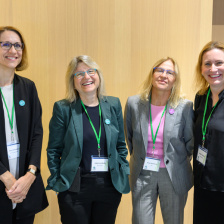
Associate Director
Professor of Biological Engineering
Faculty Director, MIT Health and Life Sciences Collaborative
Member, MIT Center for Precision Cancer Medicine
Institute Member, Broad Institute of MIT and Harvard
Contact Information
Research Areas
Nano-based drugs, Precision medicine, Immunology & immunotherapy
It’s a misnomer to label so many cancer-related proteins as ‘undruggable.’ They should be referred to as ‘yet to be drugged.’ We explore new technologies to access these challenging targets.
Research Summary
The Koehler Laboratory builds chemical tools and methods for studying proteins that are dysregulated in cancer, especially those residing within transcriptional regulatory networks. Transcription factors that become overactive in disease are promising yet untested targets for therapeutics. These proteins mediate the excessive transcription of genes whose products are required for tumor growth and metastasis. Unlike enzymes, directly modulating transcription factor function requires specific disruption or recruitment of DNA-protein or protein-protein interactions. The discovery or design of small molecules that disrupt or promote these interactions has thus far proven challenging and the protein class is often perceived to be 'undruggable.' While a few successes have been published, the chemical biology community has yet to develop general strategies for directly modulating the function of transcription factors with drug-like small molecules.
Koehler's team explores a variety of strategies to identify small molecules capable of modulating or degrading transcription factors, often involving remodeling of transcriptional complexes on chromatin. They use newly discovered probes to study the roles of specific oncogenic transcription factors, address therapeutic hypotheses in cancer, and develop selected probes into imaging agents, diagnostic tools, or therapeutic leads. The team is extending their small-molecule approach to other cancer-relevant targets, including RNA-binding proteins and cytokines.
Biography
Professor Koehler earned her bachelor's degree in biochemistry and molecular biology from Reed College in 1997. In 2003, she finished her doctorate in chemistry from Harvard University and became an institute fellow at the Broad Institute, where she served as the director of transcriptional chemical biology in the Chemical Biology Program. She was also a project leader in the NCI Cancer Target Discovery and Development Center at the Broad Institute aimed at targeting causal cancer genes with small molecules. Koehler joined the Koch Institute in 2014, and was appointed faculty lead of the MIT Health and Life Sciences Collaborative in 2025. She is the director of an NCI Next-Generation Chemistry Center focused on drug discovery for cancers of childhood driven by oncofusions. Awards include being named a Genome Technology Young Investigator and a Broad Institute Merkin Fellow. She has also received the Ono Pharma Foundation Breakthrough Science Award, the Novartis Lectureship in Chemistry, the AACR-Bayer Innovation and Discovery Award, an NSF CAREER Award, and the Junior Bose Award for Excellence in Teaching.
Koehler has founded four biotecnology companies - Ligon Discovery, Kronos Bio, 76Bio, and Samori Bio. She serves on scientific advisory boards for Kronos Bio, Photys Therapeutics, and Vicinitas Therapeutics. She also advises Pfizer, Atlas Ventures, Flagship Pioneering, and Two River Ventures. The Koehler Lab has received research funding from Bayer, GSK, Janssen Pharmaceuticals, Ono Pharmaceuticals, and Pfizer. She serves on the joint steering committee for the Broad-Bayer Oncology Alliance. Finally, she serves on the board of The Engine Accelerator.



